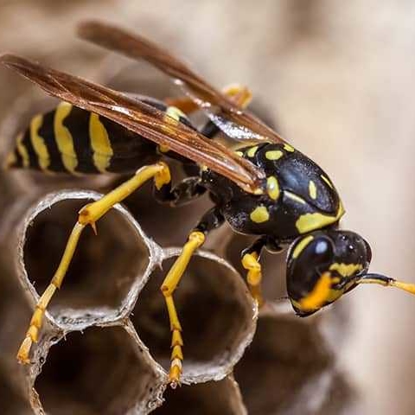
Stinging Insects

About
What are stinging insects?
Belonging to the order Hymenoptera, stinging insects typically have wings and stingers used to inject venom into their victims. This classification of insects is known as aggressive and the social species for swarming in large numbers, increasing the danger of the stings and the potential for serious medical issues.
The stinging insects in our area that people should be aware of include:
- Yellow jackets
- Wasps
- Hornets
- Bees
A few different species fall under these classifications, such as paper wasps, mud daubers, bald-faced hornets, bumble bees, and carpenter bees. For help properly identifying the stinging insects buzzing around your property, contact All State Pest Control. Having home pest control professionals identify these pests is safer than you risking a sting.
Are stinging insects dangerous?
All stinging insects can be dangerous due to the venom they possess and their aggressive nature. These pests will sting humans or animals that accidentally stumble across their nests or get close to them, causing pain or triggering allergic reactions that may result in anaphylaxis. Stinging insects may also swarm a perceived threat, stinging repeatedly; this may cause allergic reactions even in those that don’t have preexisting allergy issues.
If you get stung by any stinging insect and experience severe pain or difficulty breathing or swallowing afterward, seek medical attention immediately.
What are the signs of a stinging insect problem?
Signs of a stinging insect infestation may be subtle at first, but you can tell that an invasion is starting by seeing signs of the following:
- Visual sightings of stinging insects hovering around your property, such as the eaves of structures, under decks or patios, or near trees
- Sightings of a hive or nest on your property, either built high up or in the ground
- Damage to wood caused by stinging insects creating nests in or chewing up the materials to build nests elsewhere
Seeing one or more of these signs means that you should contact All State Pest Control for help as soon as possible.
Where are stinging insects commonly found?
Stinging insects will build their nests in a variety of locations as long as they are provided with the appropriate protection and shelter. Some species of stinging insects are considered ground nesters while others have been deemed aerial nesters, and some will nest both in the ground and in higher locations. Once on your property, these pests will create their nests in rock crevices, on rock overhangs, and under porches, decks, and roof eaves and can also be found inside attics, crawl spaces, and in outbuildings like barns, sheds, and garages. In addition, you may also find their nests around your property in and on trees and on utility poles.
How do I get rid of stinging insects?
If you want to get rid of stinging insects safely, contact All State Pest Control at the first signs of these pests on your property. Only our expert pest technicians in Nassau County can safely remove nests and prevent this pest from returning to your property, something that keeps you protected from the risk of stings and potential medical issues.
How can I prevent stinging insects in the future?
Keeping stinging insects off your property and out of your New York home can be difficult and stressful. There are some things you can do to deter them from your home and property. To keep stinging insects from finding their way into your home, try the following tips:
- Seal all exterior entry points.
- Caulk any cracks and crevices in your home's foundation and exterior walls.
- Make sure all door and window screens are intact.
- Place caps on your chimneys.
- Install weather stripping around windows and doors.
- Locate garden areas and wood piles a distance away from the outside of your home.
- Remove overgrown vegetation and piles of debris from your property.
- Trim back tree limbs away from the exterior of your home.
- Remove water sources by maintaining gutters and fixing leaky outdoor fixtures and hoses.